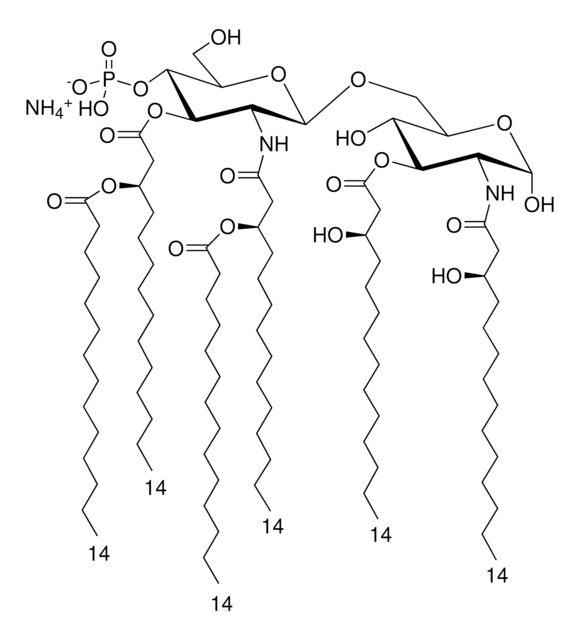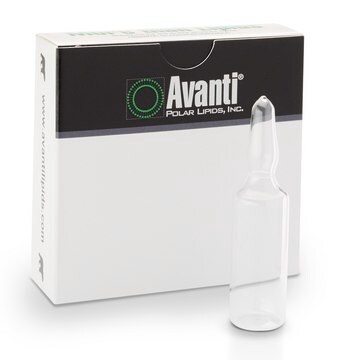870604P
Avanti
oxPAPC
Avanti Research™ - A Croda Brand 870604P, powder
Synonym(s):
oxPAPC, Oxidized 1-palmitoyl-2-arachidonoyl-sn-glycero-3-phosphocholine
Sign Into View Organizational & Contract Pricing
All Photos(1)
About This Item
UNSPSC Code:
12352211
NACRES:
NA.25
Recommended Products
form
powder
packaging
pkg of 1 × 500 μg (870604P-500ug)
manufacturer/tradename
Avanti Research™ - A Croda Brand 870604P
lipid type
phosphoglycerides
phospholipids
shipped in
dry ice
storage temp.
−20°C
General description
Oxidized 1-palmitoyl-2-arachidonoyl-sn-glycero-3-phosphorylcholine (OxPAPC) is a mixture of oxidized phospholipid and a bioactive constituent of oxidized low-density lipoproteins (LDLs).
Application
Oxidized 1-palmitoyl-2-arachidonoyl-sn-glycero-3-phosphorylcholine (OxPAPC) is suitable for use to stimulate murine alveolar macrophages in vitro. It is also suitable for use to study its effects on human aortic endothelial cell metabolic reprogramming.
Biochem/physiol Actions
Oxidized 1-palmitoyl-2-arachidonoyl-sn-glycero-3-phosphorylcholine (OxPAPC) show barrier-protective effects on human pulmonary endothelial monolayers. This lipid induce endothelial dysfunction by stimulating both pro- and anti-inflammatory pathways. OxPAPC is highly accumulated in atherosclerotic lesions and other sites of chronic inflammation.
Packaging
5 mL Clear Glass Sealed Ampule (870604P-500ug)
Legal Information
Avanti Research is a trademark of Avanti Polar Lipids, LLC
Storage Class Code
11 - Combustible Solids
WGK
WGK 3
Choose from one of the most recent versions:
Certificates of Analysis (COA)
Lot/Batch Number
It looks like we've run into a problem, but you can still download Certificates of Analysis from our Documents section.
If you need assistance, please contact Customer Support.
Already Own This Product?
Find documentation for the products that you have recently purchased in the Document Library.
Corinne M Spickett et al.
Free radical biology & medicine, 51(12), 2133-2149 (2011-10-11)
Phospholipids are complex and varied biomolecules that are susceptible to lipid peroxidation after attack by free radicals or electrophilic oxidants and can yield a large number of different oxidation products. There are many available methods for detecting phospholipid oxidation products
Identification of prostaglandin E2 receptor subtype 2 as a receptor activated by OxPAPC
Li R, et al.
Circulation Research, 98(5), 642-650 (2006)
Arid5a-deficient mice are highly resistant to bleomycin-induced lung injury
Dubey PK, et al.
International Immunology, 29(2), 79-85 (2017)
Signal transduction pathways activated in human pulmonary endothelial cells by OxPAPC, a bioactive component of oxidized lipoproteins
Birukov KG, et al.
Microvascular Research, 67(1), 18-28 (2004)
Oxidized phospholipids regulate amino acid metabolism through MTHFD2 to facilitate nucleotide release in endothelial cells.
Hitzel J, et al.
Nature Communications, 9(1), 2292-2292 (2018)
Our team of scientists has experience in all areas of research including Life Science, Material Science, Chemical Synthesis, Chromatography, Analytical and many others.
Contact Technical Service








